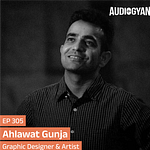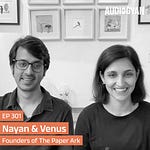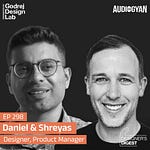“The characteristics of jazz help. Its sense of improvisation, individualism, sound, and rhythm are all present and important in graphic design, too.” - Niklaus Troxler, who have been improvising with letterforms like Jazz Musicians since 1960s.
In my opinion, a Poster is a mix of typeface and graphics communicating something. In here, typeface matters a lot. To discuss this and more, today we have Sarang Kulkarni with us.
Sarang is a type designer and co-founder of Ektype. He also has his own agency called as The White Crow where he does branding and typography work. This Audiogyan will be in English and Marathi.
Questions
What according to you is Type / Akshar?
Massimo Vignelli said that he is comfortable with half a dozen typefaces lasting a lifetime. Rest all is visual pollution. What's the need for more typefaces?
What triggers a need for new typefaces? Medium, Language, Expression, Enhancement, Technology, Content?
Are there ways to systematically study and distinguish between an improvisation of a typeface versus a different typeface? For eg, Mukta and Modak have different anatomy, so we can say that they are 2 different fonts. But can we say that Inter is an improvised version of Helvetica?
You deal with a lot of abstract forms as well. At letterbox, for eg: “k” (Marathi) can be identified if one looks at the flow or series of iterations of representing ‘k’. Can a letter form be identified in isolation? What's the extent of improvisation? How abstract one can go and still make it palatable?
When can one start improvising on a typeface? When the base font is registered in everyone’s mind. For eg: Can we improvise on a newly launched font set?
Does improvisation in a typeface done only as an experiment can transform into the usage of mass communication?
What's going on with 365 days of type and more such practices and movements? Are those improvisations?
How easy or hard is it today to experiment and improvise on open-source fonts?
When does the author know that the improvisation is done?
Reference Reading














Share this post